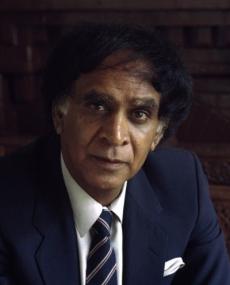
Saloojee was born in Krugersdorp, in 1935. Here his grandfather ran a shop next to Dr. Yusuf Dadoo’s father’s store.
After he was married, Saloojee’s father moved with him and his family to Roodepoort. At first he worked as a jewellery salesman, and had to rent rooms in his boss’ house. This is because it was difficult for Indians to rent property or land in the Transvaal, were prohibited from purchasing land. Later his father sold bicycles, but Saloojee’s family remained poor.
Saloojee began his school in Sophiatown at the age of 6. He was unhappy in the beginning as his clothes were old and he had no shoes. His father told him that an education was more important, and pointed to Dadoo as an example of what people could become if they were educated. Dadoo remained an important influence on the Saloojee household, and Saloojee grew up believing that the best he could do was become like Dadoo.
A few years later, after the failure of his father’s business, Saloojee’s family moved to Bloemhof. Here Saloojee made good friends with Essop Saley, who introduced him to the wonders of Johannesburg, where Saley went to High School. Eventually Saloojee visited Johannesburg against his parent’s wishes, but they agreed to let him stay there and finish school. It was in Johannesburg that Saloojee was exposed to politics, and here that he joined the Transvaal Indian Youth Congress, and was involved in many school activities.
In 1954, Saloojee matriculated, and began studying medicine- according to his father’s wishes. However, after a short spell in Bombay at a science college, he retuned to South Africa to train as a teacher. He enrolled at the Transvaal College of Education, where Robert Sobukwe taught. He was impressed by Sobukwe’s intelligence, but did not agree with all his political ideas, and remained politically inactive for the next few years.
In 1967, Saloojee took up directorship of the Johannesburg Indian Social Welfare Agency. He began moving away from teaching, which he had come to dislike as a result of the Bantu Education system. Saloojee began to meet people that were actively involved in the liberation struggle, and became involved with the liberal and multi-racial in Johannesburg. He became chairman of the alternative theatre group ‘Phoenix players’ and was a founder of the Market Theatre.
Saloojee was then awarded a scholarship to Princeton University, and spent a year in the USA. He returned to find that he could not rent the same house in Johannesburg, and that there were no other houses for an Indian to rent in the area. He therefore decided to move into a White area, and while the landlord did not mind, the police soon arrived and told the family to leave. The family resisted, and said that the Group Areas Act did not stop somebody from renting a house in another area if there were none to rent in their own area. The case made it to court, and Saloojee - along with other victims of the same injustice - formed the Act to Stop Evictions (ACTSTOP).
In early 1980, Saloojee’s sons who were in High School at the time and surprisingly politically aware further involved him in politics. In 1981, the government introduced an Indian Council, which Saloojee rejected, as Indians had never had the vote in South Africa and he was opposed to institutionalised racism. The Transvaal Indian Congress was also against the Council, as it desired participation in one parliament. Many people boycotted the elections.
However, only a few years later the government introduced the Tricameral Parliament, which Saloojee objected to. He decided to involve himself in the United Democratic Front (UDF), and played a key role in the Front as Treasurer. This led to Saloojee’s arrest and trial in the Pietermaritzburg Treason Trial. On his release he continued to be involved in politics, and from 1994 to 1999 he served as chairman of the social welfare portfolio committee in Parliament.
Saloojee died in Johannesburg on 1 February 2009, and is survived by his wife Khatija, and his two sons, Riaz and Mohamed.